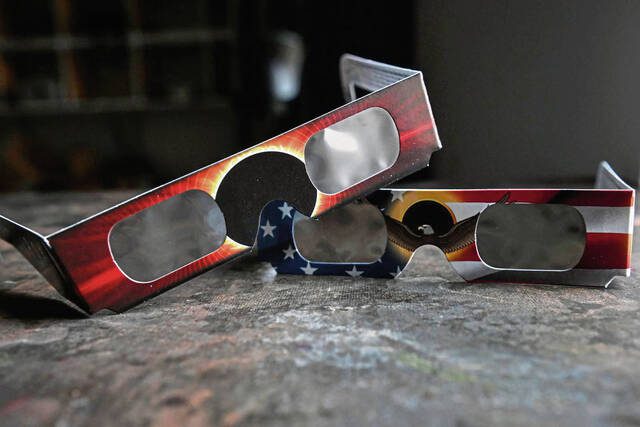Though it might be tempting to sneak a look, advice from health officials is clear: It’s not safe to watch the April 8 solar eclipse without proper eye protection.
In Pittsburgh, there will be a partial solar eclipse, with 95% totality around 3:15 p.m. Those in Erie to the north will witness a total solar eclipse.
In these areas and globally, looking directly at the eclipse will harm your eyes due to UV rays from the sun, stated Dr. Sarah Zambotti, an optometrist at Allegheny Health Network.
Those interested in viewing the eclipse should use protective eclipse glasses approved by the American Astronomical Society. Taking a quick peek without these glasses, or while wearing regular sunglasses, will not sufficiently protect against potential injury, she explained.
“The biggest misconception is that it’s safe to look at it with your naked eyes, or to glance for a moment and then look away,” she emphasized. “It is truly unsafe to view it with your naked eyes.”
Dr. Carol Fox, chief medical officer at Independence Health System, warned that solar retinopathy, a type of eye damage caused by looking at the sun during an eclipse, can result in permanent vision loss.
“Directly looking at the sun can hit your retina and lead to permanent damage,” Fox stated. “It can inflame or essentially burn the retina.”
According to the American Academy of Ophthalmology, symptoms of solar retinopathy may include blurry vision, headaches, a blind spot in the center of your vision, increased light sensitivity, distorted vision, and changes in color perception. If you believe you have injured your eyes by looking at the eclipse, Zambotti advised contacting your eye doctor. Symptoms can sometimes be delayed for up to 30 minutes or even 24 hours.
“If you start experiencing different symptoms, or notice blurry, painful, red, or irritated eyes, or a loss of vision in the center of your visual field, it’s important to call your eye doctor immediately,” Zambotti recommended. “Thankfully, the damage usually can heal over time, but if it’s prolonged or extensive enough, it may lead to permanent vision changes.”
Looking at the eclipse without proper glasses through a camera or phone camera is also inadvisable, she added.
“You shouldn’t simply aim your phone in that direction. Naturally, your camera will be facing the sun,” she pointed out. “Not only are you likely to still see those sun rays, but through the phone camera and on the screen, it can still be harmful.”
Even with glasses, individuals with preexisting eye conditions might consider refraining from observing the eclipse altogether.
“That doesn’t mean they can’t be outside and enjoy the darkening, but they should avoid looking at the eclipse,” she said.
Fox cautioned people to be cautious while driving or walking outdoors during the eclipse, as other drivers may be distracted and the sudden darkness in the middle of the day could be unsettling.
“Basically, there's nothing wrong with the eclipse itself. Your car will work fine, and it won't change the roads, except that there's a higher risk of issues with other drivers,” she explained. “When it becomes completely dark during the eclipse, it can be hard to see if you're in an area with no other light around.”
maintains a list
The AAS of reputable vendors for buying eclipse glasses at eclipse.aas.org. Even though it might be tempting to sneak a look, health officials advise against looking at the April 8 solar eclipse without proper eye protection.



